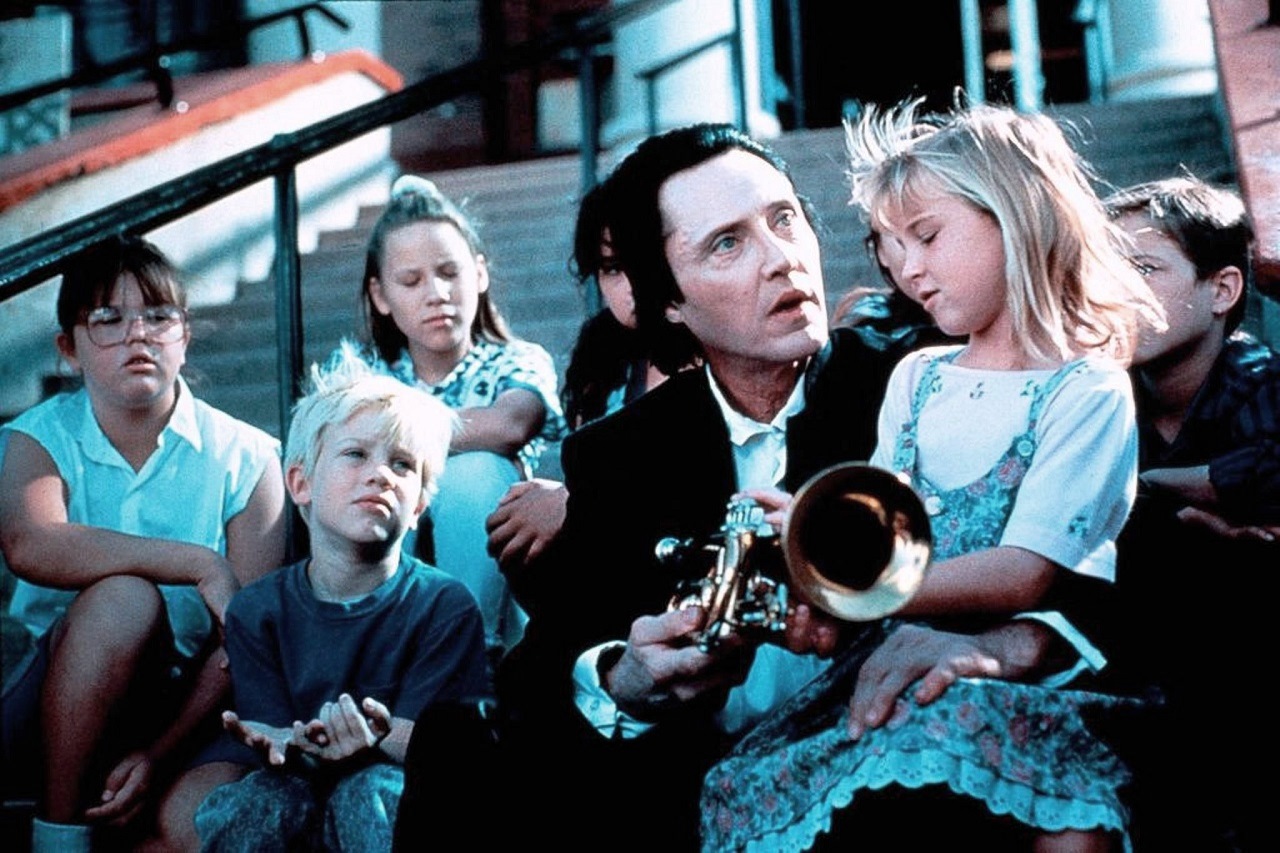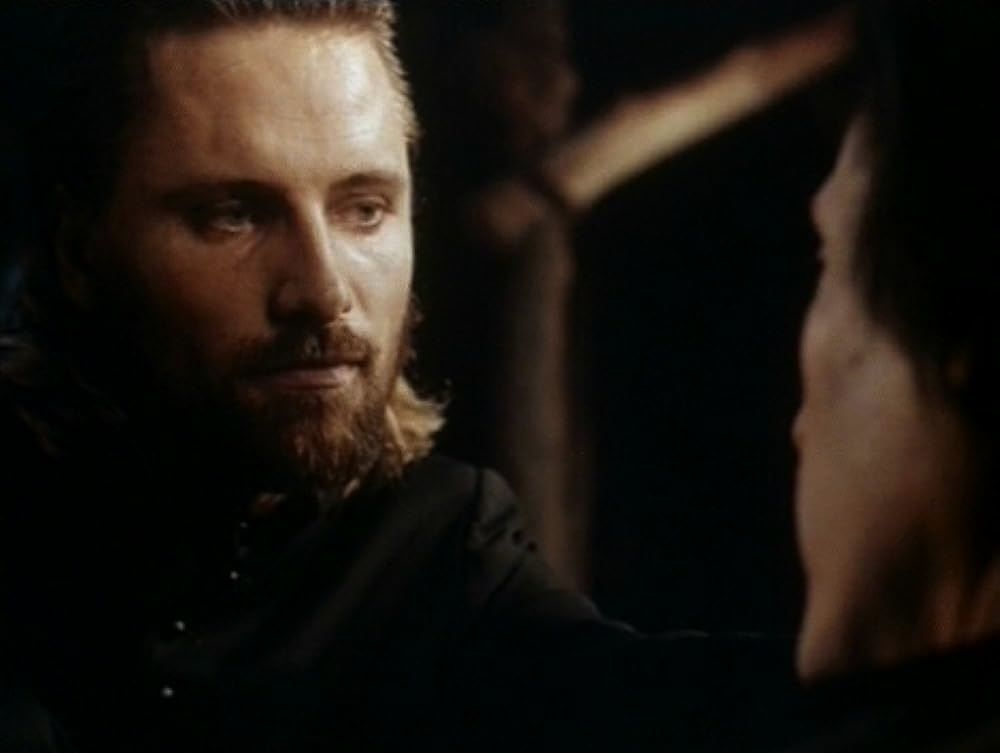USA. 1995.
Crew
Director/Screenplay – Gregory Widen, Producer – Joel Soisson, Photography – Richard Clabaugh & Bruce Douglas Johnson, Music – David C. Williams, Cave Sequence Visual Effects Supervisor – Johnson, Enemy Ghost Sequence – Todd Masters Co (Digital Supervisor – Scott Coulter), Angel Effects/Mesa Mattes – Effects Associates Inc (Supervisor – Jim Danforth), Additional Digital Effects – Available Light (Supervisor – Laurel Klick), Digital Magic Co & Neo Digital (Supervisor – Phillip Giles), Special Effects Supervisor – Jor Vankline, Makeup Effects – Patton EFX (Supervisor – Scott Patton), Production Design – Clark Hunter. Production Company – First Look Pictures/Neo Motion Pictures.
Cast
Christopher Walken (Gabriel), Elias Koteas (Thomas Dagget), Virginia Madsen (Katherine Henley), Eric Stoltz (Simon), Viggo Mortensen (Lucifer), Moriah Shining Dove Snyder (Mary), Adam Goldberg (Jerry), Amanda Plummer (Rachael)
Plot
As he investigates the case of a mysterious eyeless, hermaphroditic dead body, Thomas Dagget, a former priest who has lost his faith and is now working as a detective, is thrust into the midst of an earthly war between angels. One fallen angel Gabriel is trying to create a new Heaven. For this purpose, Gabriel seeks the soul of a Korean War colonel accused of human sacrifice. The colonel’s soul has been transplanted into the body of a young Indian girl for protection and Thomas must protect her as Gabriel comes after her.
The Prophecy is the directorial debut of Gregory Widen, previously a scriptwriter on the likes of Highlander (1986) and Backdraft (1991). (Well technically, Widen made his debut on an episode of the Tales from the Crypt (1989-96) tv series but The Prophecy was his feature debut).
With The Prophecy, Gregory Widen makes an impressively literate venture into the theme of Films About Angels. When one thinks about angels on film what invariably comes to mind is the likes of Roma Downey in Touched by an Angel (1994-2003) or Michael Landon in Highway to Heaven (1984-9) and their accompanying by much in the way of insipidly preachy feelgood family sentiments. Perhaps at its best, the feelgood angel treatment reaches the heights of an It’s a Wonderful Life (1946) or the beatific meditations of Wim Wenders’ Wings of Desire (1987) and Faraway, So Close! (1993) but most angel films seem trapped somewhere between Pollyanna fantasies and being all-but-in-name Baptist recruiting commercials.
Amidst this, The Prophecy is welcome as the first film to venture into the angelic fantasy by way of a full, heady flight of Biblical mythology and to eschew the weepy positive thinking sentiments in favour of a grand Old Testament fire and thunder. Indeed, the only other filmic efforts to venture into this take on angelic mythology is the The X Files episode All Souls (1998) and the subsequent film Legion (2010).

The Prophecy is rare for being a horror film that is conducted not with gooey meltdown effects and campy one-liners but with literacy and intelligence. (Which may well explain why it was not a major box-office success). It is certainly a film that asks patience of an audience – it is a good half-hour into the film before the often wilfully cryptic plot strands begin to coalesce and one begins to properly understand what is going on. Even when the plot has done so, one feels the odd strand is left unwound – I, for instance, was never sure what Gabriel needed the colonel’s soul for.
Gregory Widen gives his Gabriel and Lucifer some beautifully ornate pieces of dialogue: “You know how you got that dent in your top lip?” Gabriel taunts hero Elias Koteas. “Way back, before you were born, I put my finger there and said ‘shhhh’.” Equally appealing are Widen’s playfully amusing images of angels in the modern world – Gabriel resurrecting the dead because he hasn’t learnt how to drive a car or the delightful throwaway image of Gabriel sitting amongst a group of school children, getting them try out his trumpet.
If The Prophecy is to be faulted it is that its medium range budget never allows Gregory Widen to direct his angelic war with the grandiose scope it keeps seeming to want to break out into; on the other hand, this also allows him to keep the story contained at a more cerebral rather than physical level.

As Gabriel, Christopher Walken has the most fun he appears to have had in a role in some years. The role is perfectly suited to Walken and both he and Gregory Widen craft the part with just the right balance of extravagant playing to the gallery and wry, ironic humour. Also very good is Viggo Mortensen as Lucifer. Mortensen, who always seemed to elude the star quality he was eminently capable of up until the big breakthrough success of The Lord of the Rings, makes for an intense and darkly captivating Lucifer. It is one of the joyous ironies of the film that Lucifer becomes the unexpected benefactor to the hero’s struggle and even the equivalent of the Seventh Cavalry arriving to save the day at the climax.
There were four sequels The Prophecy II (1998) and The Prophecy 3: The Ascent (2000), both of these also starring Christopher Walken, and The Prophecy: Uprising (2005) and The Prophecy: Forsaken (2005) directed by this film’s producer Joel Soisson.
(Nominee for Best Original Screenplay at this site’s Best of 1995 Awards).
Trailer here


